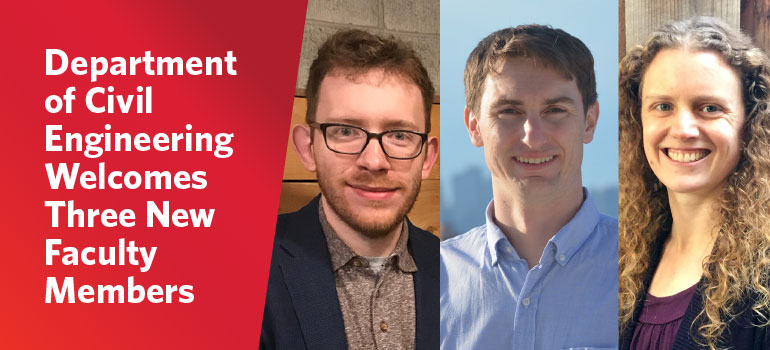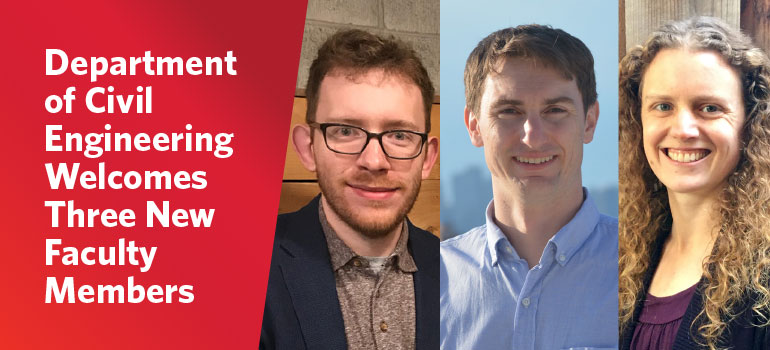
The Department of Civil Engineering is pleased to extend a warm welcome to three new world-class researchers and educators.
Dr. Zachary Bullock joins the Department as an Assistant Professor in the Geotechnical and Structural & Earthquake Engineering research areas. Having dedicated his doctoral studies to soil liquefaction for buildings on shallow foundations, he developed a line of research on ground motion prediction and seismic hazard analysis. He looks forward to continuing this research at UBC.
Dr. Bullock prioritizes the teaching aspect of his role. His graduate course will focus on seismic hazard analysis and estimating ground motion intensity for design. He plans to leverage project-based teaching to promote career readiness and help students build communication skills.
“I hope to provide my students and mentees with the skills needed to pursue impactful careers in civil engineering and catastrophe risk management,” he said. “These fields are hugely important to society now, and they will only become more important going into the future.”
Dr. Bullock obtained his undergraduate degrees in civil engineering and German language and literature from Auburn University. He went on to pursue his master’s degree at Stanford University and worked in the catastrophe risk management industry following graduation. He earned his PhD at the University of Colorado, Boulder.
To learn more about Dr. Bullock, please visit his Faculty Profile.
Also joining Geotechnical and Structural & Earthquake Engineering is Assistant Professor Dr. Trevor Carey. He has a background in mitigating the effects of natural and anthropogenic earthquakes on large geotechnical systems such as bridges, port facilities, or earthen embankment damns. Ultimately, his research focuses on providing analysis and designing tools to enable engineers to mitigate societal and economic impacts from critical infrastructure failures that occur during earthquakes.
Dr. Carey looks forward to coming to the Pacific Northwest to work on issues specific to this region. Through research and teaching, he hopes to reduce the knowledge gap of the Cascadia subduction zone, as an earthquake in this area will potentially have devastating impacts on Vancouver and lower British Columbia.
Dr. Carey challenges the traditional approach of studying geotechnical systems by representing them as a series of elements and applying idealized earthquake forces. Instead, he adopts a more holistic method.
“Using elements to investigate geotechnical system response is more direct, but it simplifies many aspects of earthquakes and does not consider other components, such as structural elements,” he said. “My research focuses on how an entire system responds, by creating scale models of complete systems and shaking the models with recorded or synthetic earthquake motions.”
Dr. Carey also plans to integrate new tools he developed during his research into the classroom to prepare students to become more knowledgeable working engineers.
“Earthquakes will eventually occur in the region, and improving the engineering community’s knowledge is only a portion of earthquake preparedness,” he said. “Training the next generation of civil engineers responsible for designing and retrofitting geotechnical systems for earthquakes is critical for earthquake hazard mitigation.”
Dr. Carey is a native of the Pacific Northwest and received his bachelor’s and master’s degrees from Oregon State University. He obtained his doctorate in geotechnical engineering from the University of California, Davis, where he also worked as a postdoctoral researcher prior to coming to UBC.
To learn more about Dr. Carey, please visit his Faculty Profile.
Dr. Rachel Scholes joins the Department as an Assistant Professor in the Environmental Systems Engineering research area. Passionate about human and environmental health, she is driven to developing holistic approaches to addressing and removing hazardous contaminants from our day-to-day lives.
Dr. Scholes is especially interested in nature-based treatment systems, such as constructed wetlands, because they require minimal energy input and provide ancillary benefits such as habitat and recreational space.
One major challenge right now Dr. Scholes hopes to address through her research is managing contaminants in stormwater.
“As rain hits our buildings and streets, it picks up a plethora of chemicals and delivers them directly to coastal ecosystems where they can harm sensitive species. In some cases, cities are also starting to capture stormwater runoff to supplement the potable water supply,” she said. “Using new analytical techniques in high resolution mass spectrometry, I hope to help enable the characterization of these mixtures of contaminants.”
A native of the Pacific Northwest, Dr. Scholes had environmental values instilled in her early in her life. She is also a serious musician, and studied both music and engineering during her undergraduate at Northwestern University. She followed graduation with a Fulbright stint in New Zealand, after which she pursued the MS/PhD program at University of California, Berkeley where her focus was in chemical contaminants in the aquatic environment. She is excited to continue to pursue her research at UBC and eager to return to a familiar region.
To learn more about Dr. Scholes, please visit her Faculty Profile.
“I am thrilled to welcome Drs. Bullock, Carey, and Scholes to the Department. They exemplify the values of UBC Civil Engineering through their high-impact research and their dedication to providing an unparallel educational experience for our students,” said Department Head Bernard Laval.
